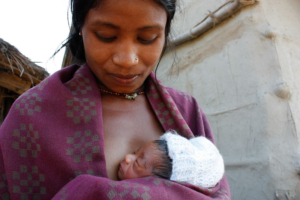Kangaroo Mother Care: A Newborn Care Technique

In 2020 alone, about 2.4 million newborns died around the globe. But, one simple newborn care technique could help bring this number down. This type of infant care is kangaroo mother care.
About Kangaroo Mother Care
Kangaroo mother care describes a style of newborn care for preterm or low birth weight infants that maximizes skin-to-skin contact between the mother and her baby and emphasizes exclusive breastfeeding — an alternative to incubator care where infants and mothers are separated for most of the day. Mothers practicing kangaroo mother care typically spend more than 15 hours each day holding their infants in a way that allows for skin-to-skin contact.
Kangaroo mother care has many benefits. Research has shown that for infants with low birth weight, this type of care can improve body temperature regulation, decease chances of hypothermia, improve physiological stability, foster healthier sleeping patterns, decrease the chance of infection or illness, and, most notably, lead to a 40% drop in mortality when compared with conventional care using an incubator or infant warmer.
How Kangaroo Mother Care is Changing
A group of Colombian doctors developed kangaroo mother care in the 1970s as a way to care for premature infants in resource-scarce hospitals. Those doctors soon found that the practice led to an unexpected drop in neonatal mortality, a trend that years of subsequent research have confirmed.
Though the practice has been slowly gaining popularity over the past several decades, new research pointed to a simple change to the technique that could make it more effective. A 2021 study that the World Health Organization (WHO) organized found that starting kangaroo mother care immediately after birth, rather than waiting for the infant to first become stable, could make kangaroo mother care even more effective at reducing infant mortality.
The study collected data from participants in five low- and middle-income countries in Asia and Africa and compared patients who practiced immediate kangaroo mother care to those who waited for the infant to stabilize before initiating kangaroo mother care, the approach that the WHO currently recommends. Beginning kangaroo mother care without waiting for the baby to stabilize led to a 25% reduction in mortality beyond the mortality reduction already associated with traditional kangaroo mother care, the study found. The WHO estimates that implementing this earlier start to kangaroo mother care could save as many as 150,000 babies’ lives every year.
The Impact of the COVID-19 Pandemic
The pandemic has affected how medical professionals approach many aspects of health care, including newborn care. A survey published in March 2021 with 1,120 respondents from 62 mostly low- and middle-income countries demonstrated that neonatal health care providers were less likely to practice kangaroo mother care during the pandemic.
Of the survey respondents, two-thirds said that they would not allow a mother who had tested positive for COVID-19 to engage in kangaroo mother care and more than one in five said they would not permit the practice even if the mother had tested negative. More generally, 85% of providers reported regularly implementing the practice before the pandemic while only 55% of providers said they still implement the practice during the pandemic.
The Benefits Outweigh Risks
Despite the decrease in kangaroo mother care during the pandemic, a separate analysis demonstrated that, for low-birth-weight infants, the benefits of kangaroo mother care far outweighed the risks that COVID-19 posed. Even in a worst-case scenario where the transmission rate between infected mothers and their infants is 100%, the mortality reduction from the practice still outweighed the mortality risk from COVID-19 65-fold. In reality, the COVID-19 transmission rate is much lower than 100%, so the benefits that this model estimates are conservative.
Given the relatively low risk of COVID-19 when compared with the benefits of kangaroo mother care, educating mothers and health care providers globally on this reality could help save countless infants’ lives. Inadequate dissemination of information, however, is not the only barrier to practicing kangaroo mother care during the pandemic.
Fewer women are opting to give birth in hospitals due to fear of catching COVID-19 and resource-strapped hospitals are sending patients home earlier. The latest data from the Africa CDC indicates that only 18.3% of Africans have received full vaccinations to protect against COVID-19. Increased vaccine distribution has the potential not only to protect more Africans from infection but to improve access to infant health care, including kangaroo mother care.
While COVID-19 has become another obstacle on the path to ending infant mortality, new findings promise a straightforward and cost-free approach to improving low birth weight newborns’ outcomes. Simply starting kangaroo mother care a few days earlier could save tens of thousands more babies’ lives every year.
– Anna Inghram
Photo: Flickr
